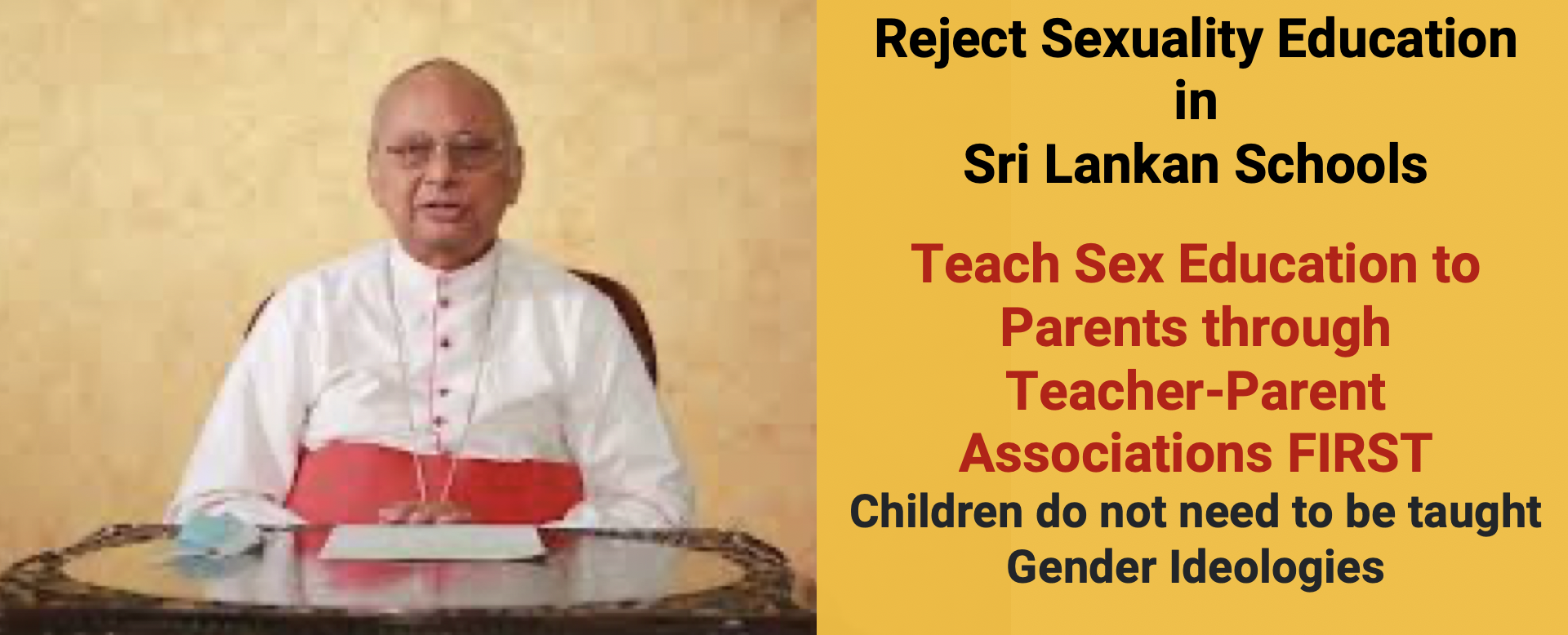CARDINAL MALCOLM RANJITH SUGGESTS : Teach Sex Education to Parents through Teacher-Parent Associations – Reject Sexuality Education in Sri Lankan Schools

In the midst of mounting pressure to introduce Comprehensive Sexuality Education (CSE) in Sri Lankan schools, His Eminence Cardinal Malcolm Ranjith offers a solution that is practical, culturally grounded, and protective of children:
age-appropriate sex education must first be taught to parents, who can then guide their children responsibly. This can be effectively implemented through Teacher-Parent Associations (TPAs), ensuring that the guidance children receive is accurate and rooted in family and societal realities. It could thereafter be extended through religious institutions, maintaining alignment with the country’s moral foundations.
The Problem with Imported CSE – Comprehensive SEXUALITY Education
The CSE programs promoted by WHO, UNFPA, and UNESCO are foreign-designed curricula that go beyond ratified law, introducing politically charged “gender” terminology, redefining biological sex, and promoting ideologies disconnected from Sri Lanka’s social, cultural, and religious contexts.
These programs claim to protect children but lack evidence-based results, even in Western countries with decades of implementation—where teenage pregnancies, abortions, and risky sexual behaviors continue to rise.
Global Resistance to CSE
Resistance to CSE is not unique to Sri Lanka.
- Kazakhstan, Kyrgyzstan and Uzbekistanhave rejected CSE outright.
- Egyptobjected to the very use of the term “sexuality education.”
- India’s Madhya Pradeshstate refused to implement it altogether.
- Ugandabanned CSE, declaring its content promotes “illicit sexual conduct” such as homosexuality and masturbation in schools.
https://hejnu.ug/status-of-ugandas-national-sexuality-education - Canada (Ontario)introduced a CSE curriculum in 2015, which was scrapped in 2018 by the new government, reverting to the older 1998 syllabus.
https://en.wikipedia.org/wiki/Ontario_sex_education_curriculum_controversy - New Zealand’s Sixth National Governmentremoved its “gender, sexuality, and relationship-based education guidelines” from the official education site in 2025.
https://en.wikipedia.org/wiki/Sixth_National_Government_of_New_Zealand - EvenUNESCO acknowledges global set-backs in the implementation of CSE, reconfirming that it remains deeply controversial.
https://cdn.who.int/media/docs/default-source/hrp/379607.pdf?download=true&sfvrsn=5b6761dc_7
These rollbacks reflect mounting concern over CSE’s ideological elements—especially those involving gender identity, orientation, and the erosion of parental, cultural, and religious values.
Thus, this one-fit-for-all syllabus is nothing that Sri Lanka’s Education Minister should take pains to promote. It raises serious concerns as to why the Education Minister appears immune to the constitutional, penal code, cultural, and religious objections being raised against this imported CSE rollout — which subtly sneaks in gender ideology, a stepping stone toward moulding children into LGBTQIA identification.
The Reality of CSE
Imported CSE frameworks go far beyond biology.
They promote gender identity, sexual orientation, and rights-based sexuality—topics alien to Sri Lankan society.
The issue is not the teaching of biological sex, which is essential, but the ideological insertion of concepts like “gender identity,” “gender dysphoria,” and “orientation,” which conflict with:
- theConstitution,
- thePenal Code, and
- thenation’s moral and religious values.
Cardinal Ranjith’s insistence on cultural caution, parental consent, and faith-based moral grounding is not anti-progressive; it is scientifically responsible and legally sound—anchored in neuroscience, community safety, and social stability.
Science confirms that a child’s brain continues to develop until around the age of 25, meaning children and adolescents are neurologically incapable of fully processing or consenting to complex sexual or gender concepts being introduced under CSE.
Early exposure to such ideological material risks confusing cognitive and emotional development rather than guiding it. Is this the hidden objective behind the all-out advocacy to introduce it to Grade 6 children who are barely 11 years old?
A Nationally Grounded Alternative
There is no justification for teaching gender ideologies in schools.
These subjects relate to only a minute fraction of the population and must not shape the curriculum of the entire nation—particularly in rural Sri Lanka, where cultural values differ vastly from urban activism, thinking & behavior.
Children must learn and be taught:
- the biological facts of the human body and reproduction,
- personal hygiene and health,
- protection from abuse (physical, emotional, and online),
- the dangers of drugs, alcohol, smoking, addiction to devices, and other harmful behaviors,
- self-respect, modesty, and discipline,
- the value of family, parental guidance, and cultural identity,
- responsible digital behavior and the impact of social media,
- mental health awareness — including how to manage emotions, peer pressure, and stress, and
- moral education rooted in Sri Lanka’s religious and cultural values.
With rising rates of drug and substance abuse, the Education Minister would do better to focus on life-skills and moral education, rather than promoting “gender identity” theories alien to our heritage.
Those who undergo gender transition are not necessarily living happier or healthier lives — many face continuous medical complications, hormonal imbalances, and the need for lifelong medication, regular tests, and surgeries.
Behind the publicized image of “freedom of choice” lies a reality of chronic medical dependence and emotional instability. Rather than glorifying such paths, education should strengthen children’s resilience, self-worth, and respect for their natural biological identity. No one should pass on their own personal trauma’s to children to suffer equally.
Reclaiming Parental Authority
By rejecting Sexuality Education in schools and promoting Sex Education through Parents, Sri Lanka reclaims the right of families to educate children consistent with national, religious, and moral values.
This approach strengthens family bonds, shields children from imported ideologies, and ensures education remains anchored in reality—not foreign political agendas.
It is time for policymakers to put the lives of Sri Lanka’s children first before submitting to funding. The wise proposal of Cardinal Malcolm Ranjith must be given due consideration. Teach parents first, reject Sexuality Education in schools, and safeguard the future of Sri Lankan children from ideologies that destroy their innocence, identity and life purpose.
Shenali D Waduge







